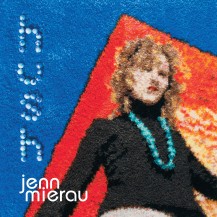Jenn Mierau’s “hush”
“As an artist, jenn mierau could usher in a new era of well-produced, well-written gothic synth pop, something that could take the sting out of formulaic glam pop. Mierau is skillfully able to pair her sensual vocals with dissonant piano chords and create a sound all her own.” – Grafton Tanner
Grafton Tanner
8.0
out of 10
Jenn Mierau
hush
September 13, 2011
Unsigned
Dark and extremely sensual, jenn mierau’s hush (yup, all lower case) is an album that pulses with deep synths and trip hop beats. What is striking about hush is that it manages to deliver several catchy tunes composed of strange chord progressions and borderline atonal loops. Even more striking is that mierau self-produced the entire album. And by the end, you feel that unity, that togetherness that can only suggest one person had a say in its creation.
The whole thing kicks off with “lovesong.” That mierau chose to open her record with a cover (The Cure) is simultaneously gutsy and alluring. It is a completely reworked song with a slow groove and a peculiar piano loop. It’s enough of a departure from the original to make the song seem fresh and bold. Following it is “hush,” a song that swirls in the burgundy wash of electric piano and creeping bass. The song is lush with a richness like wine and is already receiving some buzz around the Internet. It encapsulates mierau’s murky style perfectly and is a cornerstone of the album.
“hushabye” takes the ideas set forth in “hush” and magnifies them immensely, re-imagining the piece as a lullabye. Mierau sings directly in your ear while strings bend and detune underneath. With each whisper of “hush,” the word begins to morph and sound strange. In my mind, it conjures several forms: hush, thrush, blush, lush, crush. The song is an exercise in the bizarre nature of words as well as the percussive quality of the human breath. “Hush” is just a noise we utter to communicate meaning and feeling, and mierau takes this idea to the extreme. The song is relaxing, sensual, and uneasy all at the same time.
Mierau furthers these organic qualities on her record with “shine,” a gorgeous piece rife with thick Wurlitzer and gothic strings. It is a nice complement to the electro touches in the previous tracks and showcases mierau’s vocals stripped free of any sort of mainstream pop ham. It also highlights her ability as a songwriter and serves as a defining moment on the album. “a little blue” is without a doubt the low point of the album. Mierau delves into that pop ham I mentioned before. It’s the antithesis of “hush” in that it is poppy enough to be radio friendly but without the dark richness that permeates the rest of the album. Regardless, mierau’s other tracks are stellar enough to make up for it.
Closing the album are the “other version” songs. “lovesong (the other version)” sounds too much like the opening track to be given its own spot on the album, but “hush (the other version)” is a magnificent rewriting of the original with a static sounding avant-garde loop that would make Bjork proud. The vocals take a back seat for most of the song while distant, distorted drums pound thunderously and noise fills the ears. At the end, the sound dies away and we are left with the instrument that is the most alluring on all of hush: mierau’s voice. Smoky as always, it ends a tasteful and experimental pop album that ranks comfortably among the likes of Robyn and Lykke Li. As an artist, jenn mierau could usher in a new era of well-produced, well-written gothic synth pop, something that could take the sting out of formulaic glam pop. Mierau is skillfully able to pair her sensual vocals with dissonant piano chords and create a sound all her own. Congratulations, jenn.
